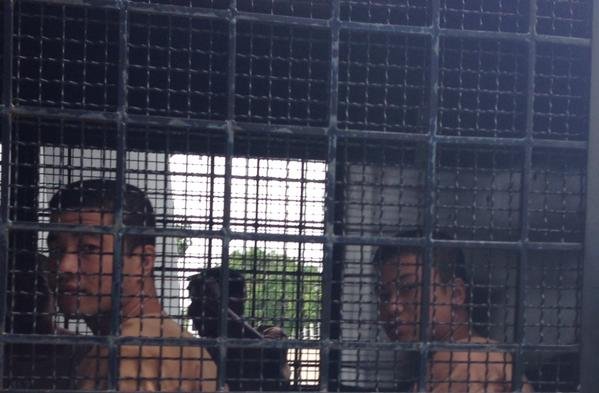The death sentences handed down to two Burmese migrant workers by a Thai court on Christmas Eve ignited widespread condemnation in Burma. Zaw Lin and Win Zaw Htun, both 22, were convicted of the murder of British tourists David Miller and Hannah Witheridge on the Thai resort island of Koh Tao in September 2014. The police investigation and proceedings were widely criticised for serious shortcomings, including allegations of police torture to extract initial confessions which the Thai authorities refused to investigate seriously. Forensic experts from Thailand and Australia have raised serious questions about DNA evidence linked to the rape of Witheridge, on which the prosecution heavily relied. Defence lawyers have said they will appeal the decision.
The verdict sparked calls for a review of the case by senior officials in Burma, including by the military commander in chief Sen-Gen Min Aung Hlaing and Burma’s ambassador in Bangkok. Protests in Burma quickly grew outside the Thai embassy in Rangoon, where a petition of 25,000 signatures was presented last week, and at protests at major land border-crossings between the two countries. Anger at the verdict spread throughout social media, and the ultra-nationalist Buddhist group Ma-Ba-Tha staged anti-Thailand protests in Rangoon.
The case has highlighted the poor treatment faced by the over two million Burmese migrant workers in Thailand, an issue that has been a source of frequent tensions between the two neighbours. Thai police, government officials and employers have been implicated in a system of pervasive abuse that includes killings, beatings, human trafficking and mistreatment of workers in the offshore fishing industry, food processing factories, plantations and farms, garment and other light industry factories, and even the lucrative tourism sector. These abuses have been documented by Human Rights Watch and others for decades.
But why in the midst of Burma’s “economic boom” are workers still migrating from Burma to work in dangerous conditions in Thailand? Abuses of labour rights, and lack of decent wages and working conditions across many parts of Burma are partly responsible. Working conditions and the lack of economic opportunities are particularly dire in Burma’s western Arakan State, where the two convicted men hail from. The state has suffered more than most other areas under decades of military mismanagement and a dearth of basic social and community services. Workers migrate to earn money to remit to their families, while local residents see few jobs and other economic benefits trickle down from major oil and gas projects granted in the state to Chinese firms. At the same time as the Koh Tao verdict was being handed down, Burma’s parliament approved a massive special economic zone and deep-sea port of 4,000 acres in Kyaukphyu in Arakan State for Chinese and Thai firms to develop, which does not auger well for the protection of worker’s rights, assuming there are jobs for local people in the project.
The international community has looked in anguish at the desperate plight of ethnic Rohingya Muslims leaving Burma and Bangladesh on rickety boats to Malaysia. But another dimension to the communal violence in Arakan State is economically deprived Arakan Buddhists are also prey for trafficking gangs and unscrupulous migrant worker brokers as they travel to Thailand for work and face abusive conditions. Many Arakanese nurse deep grievances towards the Bamar-dominated central state for the poverty produced by military rule.
[related]
Profligate land grabs in eastern and northern Burma also continue to deprive rural families of their livelihoods, causing them to send their sons and daughters across the border to work in Thailand. Increased landlessness and displacement due to natural resource extraction is generating rural unrest and protests against companies and the Burmese military who are often implicated in these land grabs, as extensive research by Global Witness documented. In visiting farming communities around Hpa-an in Kayin State in 2015, I frequently came across people in their twenties who had sought work in Thailand because of land grabs at home, often by state or military authorities who utilise unfair laws, bureaucratic opacity, and intimidation including arrests of critics, to avert compensation. Far from people returning from Thailand to take advantage of Burma’s opening, a new generation of people are heading east to earn a livelihood because their lives have either not improved or even worsened since the quasi-civilian government came to power in 2011.
Continued armed conflict in Shan State, which has displaced more than 10,000 civilians in recent months, is also causing many to flee and seek work in northern Thailand, joining tens of thousands of ethnic Shan who have fled these conflict zones since the 1980s. Despite the air of calm and talk of nationwide ceasefires, active armed conflict throughout Burma has increased since 2011, including intensive fighting in Kachin State that displaced over 130,000 civilians, providing another push factor for people inside Burmato migrate for work to its neighbours.
It is certainly understandable that many inside Burma are shocked at the Koh Tao murder case verdict and angry about the widespread mistreatment of migrant workers from Burma in Thailand. But while correctly demanding that Thailand end its rights abuses against migrants, the incoming National League for Democracy government also needs to urgently address the structural inequalities and abuses that have driven people from Burma to work and live outside their country for many years. Burma can hardly be considered as a future economic treasure trove when the benefits of its natural resources and its growing economy are not shared broadly with the rural poor, whose livelihoods continue to be insecure.
David Scott Mathieson is a Senior Researcher in the Asia Division of Human Rights Watch. The views expressed in this article are the author’s and do not reflect DVB editorial policy, nor the policy of Myanmar Now, where it was originally published.



